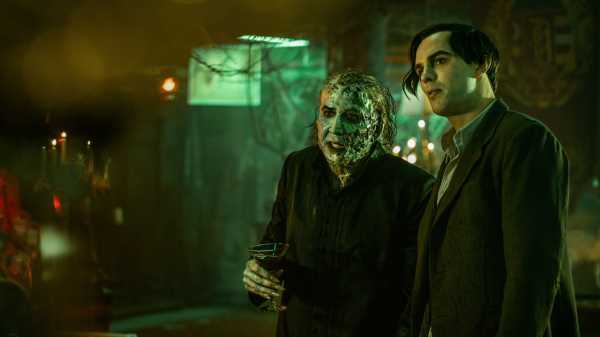
It’s a strange feeling to watch a movie made by manifestly talented people on both sides of the camera—people who have done their work thoughtfully, and have even flung themselves into it vigorously—but realize that the film doesn’t catch the spark of life. That’s what happens with “Renfield,” the new vampire comedy directed by Chris McKay, and it’s all the more disheartening because the movie is not an unpleasant one to watch. It’s bouncy, clever, amiable, and idiosyncratic, but its virtues seem inseparable from its over-all inertness and triviality. The irresistible elevator-pitch version of the movie—Count Dracula’s assistant tries to free himself from his diabolical master’s yoke—is the best thing that it has to offer; the filmmakers struggle to capture and channel the energy of this conceptual lightning bolt.
“Renfield” is the playful, torrentially gory story of Robert Montague Renfield (Nicholas Hoult), Count Dracula’s so-called familiar, a servant and handler who’s endowed with a modicum of his bloodthirsty boss’s supernatural powers. Renfield needs to find a new hideout so that they can keep a step ahead of the authorities. Young of appearance and quaint in his manners—he is, of course, more than a century old but unnaturally preserved in eternal youth—Renfield installs himself in an apartment in New Orleans and finds a basement in an abandoned hospital where Dracula (Nicolas Cage) can hole up. The prince of darkness has been horribly burned in a mystical accident, but it’s nothing that some human blood can’t fix, and procuring the living elixir is Renfield’s problem. That’s why the faithful servant attends meetings of a codependency support group—to identify its members’ unwanted partners and capture them for Dracula’s uses. In the course of those meetings, however, Renfield himself realizes that he’s in a codependent relationship with Dracula, and, equipped with new ideas, schemes to end it.
Until he dares to do so, he’s stuck in the body-trafficking business, and he gets caught up in a battle between drug dealers—which he ends with a literally decapitating punch. As a result, Renfield soon finds himself facing off against a young gangster named Teddy Lobo (Ben Schwartz), the ne’er-do-well scion of the city’s main crime family, which has a tentacular grip on the police department. Teddy doesn’t hesitate to lead an ambush against a young officer, Rebecca Quincy (Awkwafina), who tries to arrest him, and Renfield is quickly both allied and smitten with her, while making enemies of the Lobos. When Renfield finally offers his declaration of independence from Dracula, the vampire joins forces with the crooks and their leader: Teddy’s mother (Shohreh Aghdashloo), the Mob queenpin whose lair is equipped with instruments of torture. It all leads to a mighty showdown.
As logically as “Renfield” is assembled, it also feels backfilled, built not as a story that contains its own mainspring of dramatic necessity but in the conditional tense, suggesting what kind of movie based on its one-line premise might be or could be made. Its tentativeness is palpable from the very start: an extended montage that piles up backstory and introduces Dracula—or, rather, Cage—and which comes off as a film-editing rescue mission, one that can jump-start the movie with a bang of action and a blast of star power. The plot details (the story is by Robert Kirkman, and Ryan Ridley wrote the screenplay) similarly feel thrown together, in the service of spectacular scenes and specific emotional payoffs. It’s like a puzzle built backward to yield its set of answers rather than a consideration of characters and situations in the spirit of curiosity.
The colonization of commercial movies by the superhero genre and its effects-driven action is manifested in the all-too-convenient superpowers with which Renfield is endowed. (To jump-start his powers, he has to eat bugs, as Popeye needs to down a can of spinach.) Having left the dark side for the realm of virtue, Renfield beheads and mutilates and explodes bad guys, using detached limbs as weapons and unleashing champagne-like spews of blood in pursuit of liberty and justice—and of penance and redemption for his century-plus of misdeeds as Dracula’s enabler. The movie’s director, McKay, has an extensive background in animation, and the cartoon-like phantasmagoria of the corpse-strewing fight scenes, with their horror comedy of dismemberment, is the apogee of his imaginative flair. These scenes are realized solely for amusement value, and they’re done in quick cuts that both keep them from being sickening and empty them of any moral or emotional weight—but they’re also the only part of the movie with a memorable visual identity. (They also give rise to the movie’s one line of catchy patter, with a classic-movie wink: “Did I watch you cut a guy’s arms off with a decorative serving platter?” “It’s all in the wrist.”)
Renfield and Rebecca are nothing but sets of traits that push the story ahead, and neither Hoult (who’s at work on another vampire movie, Robert Eggers’s forthcoming remake of “Nosferatu”) nor Awkwafina (who ably carried the drama of “The Farewell”) can do more than flaunt their skill and their personalities. Their relationship is a flimsy sketch, and the other characters in their ambit are even slighter in substance. As for the movie’s star, Cage, playing the sanguinary supervillain with aristocratic airs, he unfolds a sardonic display of macabre theatrics that nonetheless offers no more surprises than the plot does. He’s a virtuoso of mannerisms, and he widens his eyes and waves his hands, delivers faux ingratiations and evil laughter and roars of rage that flash and echo in a void of clichés. (The actor’s irrepressible energy, when deployed on characters of substance, as in Paul Schrader’s too-little-seen crime drama “Dog Eat Dog,” can be terrifyingly thrilling.)
That said, amid the churn of clattery plot mechanics and hectic action, there’s one detail of the story that catches attention like a burr. It involves Dracula’s attempt to persuade—which is to say, to compel—Renfield to remain in his service by threatening harm to people whom Renfield cares about. The twist resounds ominously with the teeth-baring cruelty of right-wing policies as issued from the previous Presidency or from present-day state houses, suggesting the authoritarian evil of the right’s flamboyant efforts to own the libs. Whether intentional or not, as a metaphor for the ongoing depravities of unchecked power, Dracula will do. ♦
Sourse: newyorker.com






